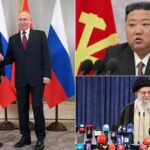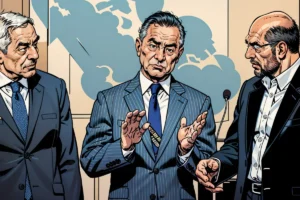President Joe Biden will roll out the glitziest of welcomes for India’s Prime Minister Narendra Modi this week. It will be a nod to New Delhi’s rise that masks the complications it brings, including what critics charge is an administration’s prioritization of traditional geopolitics over human rights.
Though he leads the world’s largest democracy, Modi has ruled as an autocratic-leaning Hindu nationalist whose government has overseen a crackdown on everyone from journalists to political opposition leaders as part of a larger targeting of Indian Muslims.
For Biden, this is more than a mere inconvenience. Human rights advocates have criticized him not just for hosting Modi, but for throwing him a state dinner, a prestigious honor bestowed upon only two other foreign leaders since Biden took office.
In private, White House officials concede they are bound by realpolitik. India is viewed as a crucial partner in the United States’ rivalry with China. More broadly, the global contest between democracies and autocracies has defined Biden’s foreign policy and the president has made the decision to cozy up to the region’s democracy, even if it is a deeply flawed one.
White House officials pledge Biden will privately take Modi to task over human rights. But that carries far less symbolism than a public rebuke. More generally, foreign policy experts agree that the U.S. doesn’t have much to gain in shunning the Indian leader.
“The United States needs India as a strategic partner to balance against China both in South Asia and in the Indo-Pacific and India needs the United States as it develops a more prosperous and green future,” said Caroline Grey of the Eurasia Group, a foreign affairs think tank. “U.S.-India relations have never been better, which might come as a surprise given India’s reluctance to impose sanctions on Russia after its invasion of Ukraine. In fact, the war in Ukraine likely reminded the Biden administration of the importance of India to its interests.”
Modi is set to arrive in Washington this week after a stop at the United Nations. His itinerary includes an address to Congress and meetings with Biden at the White House.
But the showiest moment will be a state dinner on Thursday, an honor normally reserved for close allies. So far, only French President Emmanuel Macron and South Korean leader Yoon Suk Yeol have been feted by the Biden administration in such an extravagant fashion.
The dinner will further illustrate a Modi ascendant. India just became the world’s most populous nation, his nation’s economy is surging, and he will host the world’s leaders at the G-20 in New Delhi this fall.
“It signals that the Biden administration wants to accord India the distinction of being seen as one among the closest U.S. partners and allies — even though India is not a U.S. ally, and does not seek to become one,” said Alyssa Ayres, who served as a deputy assistant secretary of State for South Asia during the Obama years. “India places a high priority on its own independence.”
While White House officials view Modi with wariness, the U.S. continues to court him as an essential bulwark on the far side of the globe. Biden has leaned on Modi not to support Russia’s invasion of Ukraine. While India has not offered Moscow any direct assistance, it has continued to purchase its gas, helping Russian President Vladimir Putin fund his war efforts.
But India’s biggest role, the administration believes, could be providing a check on China. The U.S. has elevated India as part of the Quad alliance — along with Australia and Japan — to reinforce democracy’s position in the Pacific and has pushed New Delhi to act as a buffer against the economic and territorial ambitions of Xi Jinping.
Biden administration officials have said they are not blind to India’s faults and troubles. Instead, they say in dealing with a geo-strategically vital country of 1.4 billion people, they prefer to level their criticisms behind the scenes.
But doing so, human rights activists argue, means offering a tacit blessing to the abuses taking place under Modi’s watch — and it forfeits an opportunity to improve the situation.
“The U.S. government has been far too quiet about India’s deteriorating human rights situation under Modi,” said John Sifton, Asia advocacy director at Human Rights Watch, “including India’s slide toward authoritarianism and the increasing hate speech and persecution of religious minorities.”
Sifton believes that only a public upbraiding may enact change.
“Saying nothing publicly will be seen as a green light by Modi and his leadership,” he said, “signaling that they can continue down the path they have taken towards authoritarianism and vilification of Muslims.”
When Modi came into power in 2014, former President Barack Obama largely kept him close, despite his record of anti-Muslim sentiment. In fact, nearly a decade earlier, Modi had been denied a U.S. visa on religious freedom grounds after being accused of tacitly supporting Hindu extremists who attacked Muslims years earlier in the Indian state of Gujarat, where he was chief minister.
Former President Donald Trump also sought to curb China’s influence, but he made little pretense of caring about human rights. He warmly embraced Modi at a 2019 “Howdy, Modi!” rally in Houston. The following February, Trump visited Modi in New Delhi and attended a massive rally in his honor just days before the world came to a halt at the onset of the Covid-19 pandemic. Many Hindu nationals backed Trump, who publicly also displayed an antipathy toward Muslims.
Human rights advocates cite a litany of abuses by the Modi government, including the passage of a law that discriminates against Muslims by making religion a basis of citizenship and the revocation of the autonomy granted to the majority-Muslim Jammu and Kashmir region. Some Indian states also passed “anti-conversion” laws that appear to target Muslim men who marry Hindu women. These and other moves have played out against a backdrop of more violence against religious minorities and crackdowns on government critics and journalists.
Many presidents have had to deal with unsavory foreign elements to advance U.S. political interests. Biden, when he ran for president, trashed Trump’s seeming indifference to suffering around the world, promising to put human rights at the “center” of his foreign policy. But he and his team have also made deals with nations like Saudi Arabia and Turkey.
Modi was among the first leaders with whom Biden held a virtual meeting. Biden elevated the Quad and he spent time with Modi on the sidelines of the G-7 in Japan last month. National Security Adviser Jake Sullivan was in India in recent days to finalize the details of the summit, which White House aides preview will include new economic agreements, climate commitments, and deals on semiconductors and other technologies.
“As we do with other nations around the world, we regularly engage with Indian government officials at senior levels on human rights concerns, including freedom of religion or belief and media freedom,” said Adam Hoge, a National Security Council spokesperson. “Our view is that a secure, prosperous, democratic, and pluralistic India, one that is capable of reinforcing shared values abroad, is a natural partner for the United States.”
Aides defend the decision to hold the state dinner, suggesting it is a representation of the administration’s appreciation of India’s new engagement with the world and, they say, its commitment to be a good global citizen. And Biden aides say the White House has previously chided allies about bad behavior — including, recently, Israeli Prime Minister Benjamin Netanyahu over his court reform plan — but has tended to do so out of the spotlight.
“With the emphasis the president has placed on democracy as a central pillar of U.S. policy,” said Ayres, now dean of the Elliott School of International Affairs at George Washington University, “I can’t see how he would not have a private conversation about U.S. concerns.”
Source : Politico















